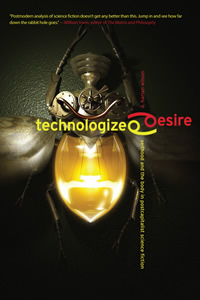 | |
| Author | D. Harlan Wilson |
|---|---|
| Cover artist | almacan & Brandon Duncan |
| Language | English |
| Genre | Science fiction, Literary criticism, Cultural theory, Literary theory, Film studies |
| Publisher | Guide Dog Books |
Publication date | 2009 |
| Publication place | United States |
| Media type | |
| Pages | 207 pp |
| ISBN | 978-1-933293-73-8 |
Technologized Desire: Selfhood & the Body in Postcapitalist Science Fiction (2009) is a book of literary and cultural criticism by American author D. Harlan Wilson. The book analyzes the evolution of technology, the self, subjectivity, culture, commodity fetishism and capitalism as it has been represented by postmodern science fiction novels and films. Ultimately Wilson points to a postcapitalist subjectivity that is an extension of technocapitalism.